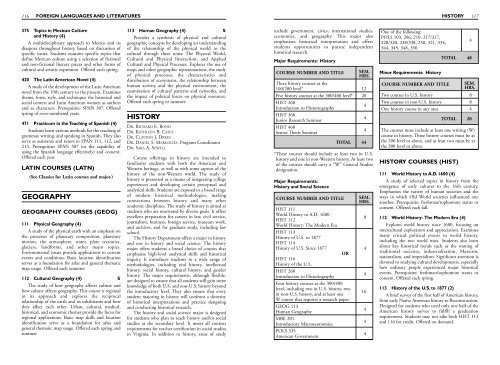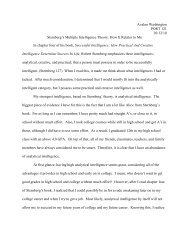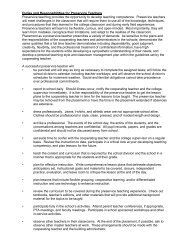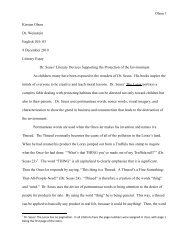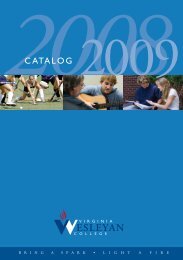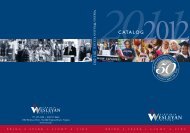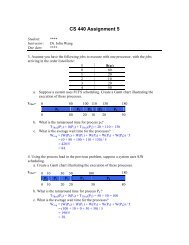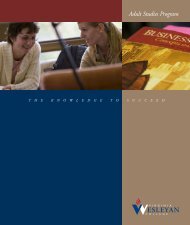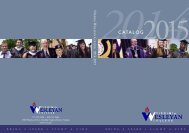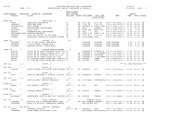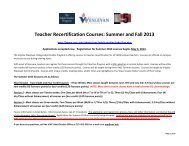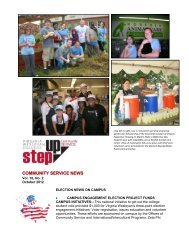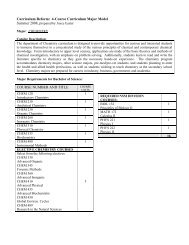116 FOREIGN LANGUAGES AND LITERATURESHISTORY117375 Topics in Mexican Cultureand History (4)A multidisciplinary approach to Mexico and itsdiaspora throughout history based on discussion ofspecific issues. Students examine specific topics thatdefine Mexican culture using a selection of fictionaland non-fictional literary pieces and other forms ofcultural and artistic expression. Offered each spring.420 The Latin American Novel (4)A study of the development of the Latin Americannovel from the 19th century to the present. Examinestheme, form, style, and technique; the historical andsocial context and Latin American women as authorsand as characters. Prerequisite: SPAN 307. Offeredspring of even-numbered years.471 Practicum in the Teaching of Spanish (4)Students learn various methods for the teaching ofgrammar, writing, and speaking in Spanish. They alsoserve as assistants and tutors in SPAN 111, 112, and213. Prerequisite: SPAN 307 (or the capability ofusing the Spanish language effectively) and consent.Offered each year.LATIN COURSES (LATN)(See Classics for Latin courses and major.)GEOGRAPHYGEOGRAPHY COURSES (GEOG)111 Physical Geography (4)A study of the physical earth with an emphasis onthe processes of planetary composition, planetarymotion, the atmosphere, water, plate tectonics,glaciers, landforms, and other major topics.Environmental issues provide applications to currentevents and conditions. Basic location identificationserves as a foundation for atlas and general thematicmap usage. Offered each semester.112 Cultural Geography (4) SThe study of how geography affects culture andhow culture affects geography. This course is regionalin its approach and explores the reciprocalrelationship of the earth and its inhabitants and howthey affect each other. Urban, cultural, medical,historical, and economic themes provide the focus forregional applications. Basic map skills and locationidentification serve as a foundation for atlas andgeneral thematic map usage. Offered each spring andsummer.113 Human Geography (4) SProvides a synthesis of physical and culturalgeographic concepts by developing an understandingof the relationship of the physical world to thecultural through three units: The Physical World,Cultural and Physical Interaction, and AppliedCultural and Physical Processes. Explores the use ofmaps and other geographic representations, the studyof physical processes, the characteristics anddistribution of ecosystems, the relationship betweenhuman activity and the physical environment, theexamination of cultural patterns and networks, andthe impact of political forces on physical resources.Offered each spring or summer.HISTORYDR. RICHARD E. BONDDR. KATHLEEN B. CASEYDR. CLAYTON J. DREESDR. DANIEL S. MARGOLIES, Program CoordinatorDR. SARA A. SEWELLCourse offerings in history are intended tofamiliarize students with both the American andWestern heritage, as well as with some aspects of thehistory of the non-Western world. The study ofhistory is presented as a means of integrating collegeexperiences and developing certain perceptual andanalytical skills. Students are exposed to a broad rangeof modern historical methodologies, makingconnections between history and many otheracademic disciplines. The study of history is aimed atstudents who are motivated by diverse goals. It offersexcellent preparation for careers in law, civil service,journalism, business, foreign service, museum work,and archives, and for graduate study, including lawschool.The History Department offers a major in historyand one in history and social science. The historymajor offers students a broad choice of courses thatemphasize high-level analytical skills and historicalinquiry. It introduces students to a wide range ofmethodologies, including oral history, intellectualhistory, social history, cultural history, and genderhistory. The major requirements, although flexible,are designed to ensure that all students will gain someknowledge of both U.S. and non-U.S. history beyondthe introductory level. They also ensure that everystudent majoring in history will confront a diversityof historical interpretations and practice designingand conducting historical research.The history and social science major is designedfor students who plan to teach history and/or socialstudies at the secondary level. It meets all contentrequirements for teacher certification in social studiesin <strong>Virginia</strong>. In addition to history, areas of studyinclude government, civics, international studies,economics, and geography. This major alsoemphasizes historical interpretation and offersstudents opportunities to pursue independenthistorical research.Major Requirements: HistoryCOURSE NUMBER AND TITLESEM.HRS.Three history courses at the100/200 level* 12Five history courses at the 300/400 level* 20HIST 260Introduction to Historiography4HIST 360Junior Research Seminar4HIST 460Senior Thesis Seminar4TOTAL 44*These courses should include at least two in U.S.history and one in non-Western history. At least twoof the courses should carry a “W” General Studiesdesignation.Major Requirements:History and Social ScienceCOURSE NUMBER AND TITLESEM.HRS.HIST 111World History to A.D. 16008HIST 112World History: The Modern EraHIST 113History of U.S. to 1877HIST 114History of U.S. Since 1877 4ORHIST 116History of the U.S.HIST 2604Introduction to HistoriographyFour history courses at the 300/400level, including two in U.S. history, two16in non-U.S. history, and at least oneW course that requires a research paperGEOG 1134Human GeographyMBE <strong>2014</strong>Introductory MacroeconomicsPOLS 3354American GovernmentOne of the following:POLS 103, 206, 210, 217/317,220/320, 238/338, 250, 321, 334,344, 345, 348, 350Minor Requirements: HistoryCOURSE NUMBER AND TITLE4TOTAL 48SEM.HRS.Two courses in U.S. history 8Two courses in non-U.S. history 8One history course in any area 4TOTAL 20The courses must include at least one writing (W)course in history. Three history courses must be atthe 200 level or above, and at least two must be atthe 300 level or above.HISTORY COURSES (HIST)111 World History to A.D. 1600 (4)A study of selected topics in history from theemergence of early cultures to the 16th century.Emphasizes the variety of human societies and theways in which Old World societies influenced oneanother. Prerequisite: freshman/sophomore status orconsent. Offered each fall.112 World History: The Modern Era (4)Explores world history since 1600, focusing onintercultural exploration and appreciation. Examinesmany critical political events in world history,including the two world wars. Students also learnabout key historical trends such as the waning oftraditional societies, industrialization, Marxism,nationalism, and imperialism. Significant attention isdevoted to studying cultural developments, especiallyhow ordinary people experienced major historicalevents. Prerequisite: freshman/sophomore status orconsent. Offered each spring.113 History of the U.S. to 1877 (2)A brief survey of the first half of American history,from early Native American history to Reconstruction.Designed for students who need only one half of theAmerican history survey to fulfill a graduationrequirement. Students may not take both HIST 113and 116 for credit. Offered on demand.
118 HISTORYHISTORY119114 History of the U.S. Since 1877 (2)A brief survey of the second half of Americanhistory, from Reconstruction up to the present.Designed for students who need only one half of theAmerican survey to fulfill a graduation requirement.Students cannot take both HIST 114 and 116 forcredit. Offered on demand.116 History of the United States (4)A survey of the history of the United States fromapproximately 1400 to the present. Examines themajor political, social, cultural, intellectual, religious,and economic trends over the course of the nation’shistory. Designed primarily to fulfill state competencyrequirements for prospective teachers. Offered eachsemester.219 Topics in Asian History (4) HAn examination of selected topics in the history ofAsia that varies from year to year and focuses on suchareas as China, Japan, India, and the Near East. Maybe repeated for credit as designated topics change.Offered spring of odd-numbered years or ondemand.220 The Civil War and Reconstruction (4) HExamines the causes, experience, significance, andlasting legacies of the Civil War and Reconstruction.Topics include the ongoing crisis of sectionalism andnationalism, the political, ideological, and moralconflict over slavery, the impact of expansionism, theideological development of a revolutionary South,and the impact of the war on national politics,culture, and memory. Heavy emphasis is given to thewar itself: the battles, leaders, common soldiers,tactics, diplomacy and economics of this greatconflict. Finally, students explore the mixed results ofthis war for the victorious North, the defeated South,and the restored nation during Reconstruction andbeyond. Offered spring of even-numbered years.248 Medieval Islamic World (4) VAn honors course in the history, religion, andculture of the Islamic Near East, Spain, Africanempires and Swahili Coast, the Ottoman Empire andMogul India from Mohammed the Prophet to the17th century. Prerequisite: Membership in theHonors and Scholars program or consent. Offered ondemand.250 Topics in American History (4) HApplies skills in historical analysis to a variety ofgeographical, chronological, cultural, social, andpolitical topics. Students learn how societies changeover time, analyzing primary documents in theirhistorical context and developing independentarguments based on primary sources. Requires an8-10 page paper based on primary source evidence.Topics for HIST 250 sections are available from theHistory Department before registration begins eachsemester. May be repeated for credit as topics change.Prerequisite/corequisite: ENG 105. Prerequisite forWinter Session: successful completion of ENG 105with a grade of C or higher.251 Topics in European History (4) HApplies skills in historical analysis to a variety ofgeographical, chronological, cultural, social, andpolitical subjects. Students learn how societies changeover time, analyzing primary documents in theirhistorical context and developing independentarguments based on primary sources. Requires an8-10 page paper based on primary source evidence.May be repeated for credit as topics vary. Topics anddescriptions are available from the HistoryDepartment before registration begins each semester.Prerequisite/corequisite: ENG 105. Prerequisite forWinter Session: ENG 105 with a grade of C orhigher. Offered each semester and in selectedWinter Sessions.252 Topics in Non-Western History (4) HApplies skills in historical analysis to a variety ofgeographical, chronological, cultural, social, andpolitical subjects. Students learn how societies changeover time, analyzing primary documents in theirhistorical context and developing independentarguments based on primary sources. Requires an8-10 page paper based on primary source evidence.May be repeated for credit as topics vary. Topics anddescriptions are available from the HistoryDepartment before registration begins each semester.Prerequisite/corequisite: ENG 105. Prerequisite forWinter Session: ENG 105 with a grade of C orhigher. Offered each semester and in selectedWinter Sessions.260 Introduction to Historiography (4)Students analyze the differing schools that havedeveloped around various historical questions andlearn how to enter into historical debates by engagingother historians. They also are exposed to some of themost important methodologies in the discipline ofhistory. Prerequisite: a declared major in history,history and social science, or history minor. Offeredeach spring.262 Seminar in the Historyof European Cities (4)Investigates the history of various European cities,including Berlin, Paris, London, Vienna, and Prague.Focuses on the history of art, architecture, cityplanning, and public spaces. Through walking tours,visits to museums and key landmarks, and musicalperformances, students investigate the historicaldevelopments of the cities, especially the conflictsradiating from the construction and destruction ofthe urban landscape. Begins at VWC with anon-campus component in which students prepare foran on-site study of the city. This study is followedby travel to the destination. Offered in selectedWinter Sessions.286 Banned Books (4)An interdisciplinary exploration of banned books;the legal battles in U.S. history that created,supported, and ended censorship; and the literary,legal, aesthetic, and socio-political contexts thatinfluenced both the artists and the changingconceptions of obscenity that marked their works ascontroversial. Students may not also receive credit forENG 286. Offered in selected Winter Sessions andspring semesters.303 17th- and 18th-Century America (4) WA study of the social, cultural, religious, anddemographic changes that took place over twocenturies in early American history. Topics studiedinclude Native American life; encounters betweenwhites and Indians; the political, economic, andsocial formation of the colonies; free and enslavedblack life; African, European, and American culturaldevelopment; and religion, among others. Offered fallof even-numbered years.306 Seminar in Asian History (4) HAn intensive overview of Mongolian political,economic, social, and cultural history from the rise ofChingghis Khan’s global empire through the collapseof Communism. Focuses on empire, warfare,revolution, and national consolidation. Includesconsideration of intangible cultural heritage andtraditional music and dance. Offered fall of oddnumberedyears.313 19th-Century America (4) HAn intensive exploration of major themes, events,and individuals in United States history betweenThomas Jefferson’s presidency and the Spanish-American War. Topics include territorial andgovernmental expansion, the politics of slavery andfreedom, the Civil War and its aftermath, theindustrial revolution, urbanization, imperialadventurism, and other transformations that markedthis tumultuous and fascinating time in history.Emphasizes historiographical interpretations of thehistorical changes and their meanings. Prerequisite:sophomore/junior/senior status. Offered fall of evennumberedyears.314 First and SecondGreat Awakenings (4)H,WA study of the social, cultural, religious, anddemographic causes and consequences of the Firstand Second Great Awakenings. Prerequisites: ENG105 with a grade of C or higher and sophomore/junior/senior status. Offered spring of evennumberedyears.316 Medieval Europe (4) HA survey of the cultural, religious, political, andeconomic changes that Europe underwent from the“fall” of Rome to the Black Death. Prerequisite:sophomore/junior/senior status. Offered spring ofodd-numbered years.317 History of <strong>Virginia</strong> (4) HAn exploration of the history of theCommonwealth of <strong>Virginia</strong>. Topics includePowhatan culture, early colonial life, the origins ofslavery and the construction of race, gentry and slaveculture, the Civil War, and the 20th century. Mayrequire field trips to historic sites. Prerequisite:sophomore/junior/senior status. Offered each fall.319 Early Modern Europe, 1300-1789 (4) WAn investigation of European history during thetransition from medieval to modern forms ofpolitical, cultural, religious, and social dimensions oflife. The course explores the concept “early modern”as it emerged in the Renaissance, Reformation, andEnlightenment movements. Prerequisites: successfulcompletion of ENG 105 with a grade of C or higherand sophomore/junior/senior status. Offered springof even-numbered years.322 Religion and Social Issuesin American History (4)An interdisciplinary examination of major socialissues in American history such as slavery, racialequality, and the status of women. Explores thereligious influences, background, and context of thesesocial issues which have had a profound effect onAmerican history and continue to reverberate inAmerican society today. Prerequisites: at least 6semester hours in history, religious studies, politicalscience, English, interdisciplinary studies, philosophy,or sociology and junior status or consent. Offered ondemand.323 Tudor England (4) WA detailed introduction to the history of 15thand16th-century England that explores the political,social, economic, religious and intellectual trendsresponsible for the renaissance of culture thatcharacterized the Elizabethan Age. Prerequisite:sophomore/junior/senior status. Offered fall of evennumberedyears.


